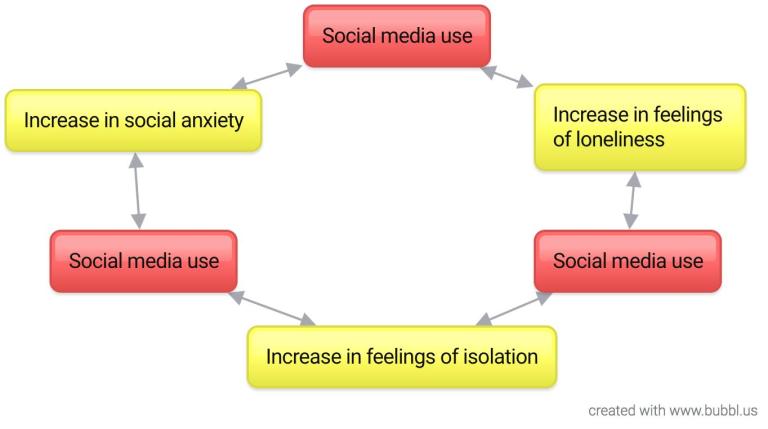Social media can connect us to exisiting friends and family, as well as open us up to new connections and social circles. It is therefore logical that we view ‘social media’ as a highly social tool. However, increasingly we are looking into the possibility that social media causes or increases loneliness, social isolation and overall mental health. According to Pittman & Reich (2016) the feeling of loneliness is rising in people aged 18-34 years. Can this somehow be attributed or linked to heavy social media usage by this group?
The suggestion that social media is causing isolation is based on the notion of social anxiety, placing importance on peer opinions and comparing oneself to others. Davey (2016) explains social anxiety as the fear of social situations and he explains that those who rely on the approval of others are more vulnerable to the condition. Imagine someone who relies on the approval of their peers having access to platforms which quantify friendships, allow for instant external approval in the way of ‘likes’ and are available to check 24/7. That’s exactly what social media does. If those with a preexisting condition of social anxiety feel they have ‘failed’ on social media they can become even more anxious, possibly resulting in higher feelings of loneliness and isolation. According to Davey (2016), this can become a cyclical process. See image below:

Hosie (2017) also links heavy social media use to social isolation and increased FOMO.

Collins (2017) reports that young adults who use social media are twice as likely to feel more socially isolated than those who do not use social media and those who log in to social media apps several times per day are more than 3 times as likely to feel socially isolated than those who have low social media usage.

The question we need to ask though – does this mean that social media causes feelings of isolation, or are those with preexisting feelings of isolation more prone to overuse of social media? Studies are unsure, however, we can assume that if someone is already suffering from social anxiety they may be more easily attracted to social media as a way of obsessing over social interaction.
Furthermore, are there groups in society who are more vulnerable to social isolation as a result of heavy social media use? Studies carried out in the USA show that social media use in college students can result in higher perceived social isolation (Willingham AJ 2017). Also, there has been a link to social isolation in youth (aged 12-15 years) as sometimes social media use is linked to bullying and the development of depression, leading very possibly to social isolation (Lloyd A 2014).
However, according to Lloyd (2014) social media actually helps to combat social isolation in migrant youth or youth living with a disability as they are given the opportunity to connect with others who may be facing similar challenges to their own. Also, social media has seen to be a positive social tool for the aged as some individuals may lack mobility or are restricted socially due to their health. An app developed specifically for the aged, called Enmesh, is now being trialed in Australia (Waycott 2015). Follow the tweet below for more information about both the case for and against social media causing social isolation.
Clearly it is not an easy question to answer. Yes, there are links between social media and social isolation in youth and young adults. However, it is unclear if Social Media actually causes social isolation or if those already suffering from social isolation are more drawn to the platforms. Also, we can see that for some minority groups social media can actually act as an import tool to combating social isolation and providing social guidance.
Are you worried about social media and it’s impact on your feelings of isolation? Check out my tips below.
References:
Cambridge Dictionary, 2017, ‘Meaning of FOMO in English Dictionary’, retrieved 3 August 2017, <http://dictionary.cambridge.org/dictionary/english/fomo>.
Collins, F 2017, ‘It’s Not Your Imagination: Social Media Is Making Us Lonelier’, retrieved 1 August 2017, MasterFILE Premier.
Davey, GCL 2016, ‘Social Media, loneliness and anxiety in young people’, Psychology today, weblog post,15 December, retrieved 26 July 2017, <https://www.psychologytoday.com/blog/why-we-worry/201612/social-media-loneliness-and-anxiety-in-young-people>.
Lloyd, A 2014 ‘Social Media Help or Hinderance: What role does social media play in young people’s mental health?’ Psychatria Danubina, vol.26, no.1, pp.340-346, retrieved 1 August 2017,<http://www.hdbp.org/psychiatria_danubina/pdf/dnb_vol26_sup1/dnb_vol26_sup1_340.pdf>.
Pittman, M & Reich, B 2016 ‘Social media and loneliness: Why an Instagram picture may be worth more than a thousand Twitter words’, Computers in Human Behaviour, vol.62, pp. 155-167, Science Direct Database,retrieved 1 August 2017, <https://doi.org/10.1016/j.chb.2016.03.084>.
Waycott, J 2015, ‘Connecting online can help prevent social isolation in older people’, The Conversation, 19 November, retrieved 27 July 2017, <https://theconversation.com/connecting-online-can-help-prevent-social-isolation-in-older-people-50314>.
Willingham, AJ 2017, ‘Study links social media use to isolation in young adults,’ CNN Wire, 6 March, retrieved 1 August 2017. <http://edition.cnn.com/2017/03/06/health/social-media-isolation-study-trnd/index.html>.
Creative Commons

A really informative blog about social media and mental health! Great use of journal articles and other resources to support the frameworks and factual information within the blog. I love the addition of your tips on how to stay healthy and happy on social media. Further to this, you have used a good variety of media, which kept me engaged throughout the blog.
Of course, its not an easy question to answer, but I’m still not sure whether or not you think social media makes us lonely and isolated. I would love to read some of your own opinion on the issue and potentially build an argument to whether or not you believe it causes isolation.
LikeLike
Hi Eva,
I think this subject matter is concerning and interesting on many levels. FOMO and social media anxieties is a real worry especially as the online platforms continue to evolve. It would be interesting to revisit this blog in a few years times to see how the incoming generations such as Alpha and Gen Z handle FOMO.
In terms of your blog, your tips within the video are excellent and I’ve done similar things to prevent social media anxiety from occurring in my life. My only other additional comment/tip would be to get people to speak to a mentor, friend or mental health care profession if they are experiencing depression linked to social media. Perhaps include a link to beyondblue may be the final touch as social media anxiety may be highlighting a deeper issue than just FOMO.
You have incorporated images, video and embedded tweets really well and it flows smoothly and cohesively. I also like the font text you used as it’s easy to read. My other suggestion would be to perhaps add some headings or something to break up the text and highlight key words or phrases you want to stand out via italics, bold or a different coloured front.
Overall, great job and good luck with your next blog 🙂
LikeLike
Hi Eva,
Your post is really well written. Just as I was beginning to form a question in my mind based on what I’d read in your post, you asked and then answered that question – good job. Your use of the graphic to define ‘FOMO’ was well placed and added to the emotion and empathy contained within the post and your link to the Conversation article added depth to the information you presented.
I felt the link to the earlier post was clever and provided good additional information – the case for and against, with a verdict, was a good presentation strategy – but there was a bit of repetition in this second post.
Presentation of your ‘tips’ in the YouTube video/tweet demonstrated your good sense of social responsibility.
LikeLike
Hi Eva,
A very good post in relation to social media and isolation. I did a similar research concerning this topic in one of my research units and I think I could answer your question that was raised at the end of your blog post. I strongly believe social media does cause social isolation. There are several traits that contribute towards this behavior but the most common trait seen across all the research study that substantially adds into this feeling of isolation or specifically “loneliness” is due to the excessive use of gadgets (smartphones, video gaming) and the Internet (social media). I just generalized my key point to keep this feedback short but if you are interested do check this research study (http://journals.sagepub.com/doi/abs/10.1177/0894439314528779) .
Overall, I enjoyed reading your post. Liked your topic selection, your argument and the way you effectively used a range of media like canva and the bubbl.us to make your point visually. A video accompanying your topic was a great addition but just like Kelly suggested, I felt that you should have interviewed a specialist in the field or a person affected by social isolation to make your video strong. Thanks for a great read again. Looking forward to your next post.
LikeLike
Hi Eva,
Great topic, and one that I’m interested in given I a close friend suffers from anxiety that is amplified by his social media use; I see many of the negative aspects that you’ve described in his behaviour, which is a little scary!
Just in the first paragraph, I think a word might be missing… “However, increasingly we are looking into the possibility that social media causes or increases loneliness, social isolation and overall mental health.” The way this is written, it’s suggesting that social media increases overall mental health, not that it necessarily has a negative impact?
Interesting to also note that FOMO can be both a positive and a negative thing, depending on your perspective. As a marketer, I try to invoke FOMO to convince people to purchase/attend events!
LikeLike
Hello Eva,
Your topic is of a concerning nature as it is probably one of the questions we need to ask ourselves today, right now. Reading your post reminds me of a documentary I saw on the internet where the boy was so engrossed in using Tinder, he missed his chance with a beautiful girl standing across him, who needed his help when she tripped and fell on the ground. As you have mentioned that SM is a highly social tool but we don’t realize how and when it is turning us anti-social (one of the root causes of depression and isolation), it is important that we at least acknowledge the problem.
I am highly impressed with your adept use of bubbl and other interactive media to get your message across. Your blog is replete with scholarly sources but at the same time doesn’t exclude your personal take on it. Honestly, it is hard to pinpoint anything wrong with your blog, your conclusion also seems appropriate as it offers a solution and creates room for introspection.
So, I am going to say- I love it! Looking forward to your next one soon! Thanks.
LikeLike